Related Research Articles
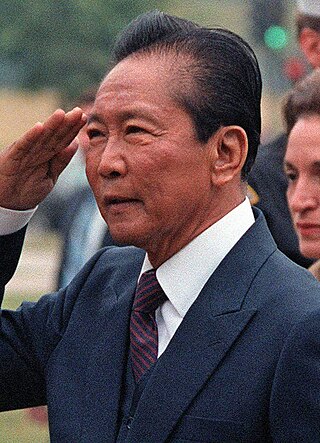
Ferdinand Emmanuel Edralin Marcos Sr. was a Filipino politician, lawyer, dictator, and kleptocrat who served as the tenth president of the Philippines from 1965 to 1986. He ruled under martial law from 1972 until 1981 and kept most of his martial law powers until he was deposed in 1986, branding his rule as "constitutional authoritarianism" under his Kilusang Bagong Lipunan. One of the most controversial leaders of the 20th century, Marcos's rule was infamous for its corruption, extravagance, and brutality.

Benigno "Ninoy" SimeonAquino Jr., was a Filipino politician who served as a senator of the Philippines (1967–1972) and governor of the province of Tarlac. Aquino was the husband of Corazon Aquino, who became the 11th president of the Philippines after his assassination, and father of Benigno Aquino III, who became the 15th president of the Philippines. Aquino, together with Gerardo Roxas and Jovito Salonga, helped form the leadership of the opposition towards then President Ferdinand Marcos. He was the significant leader who together with the intellectual leader Sen. Jose W. Diokno led the overall opposition.

The Senate of the Philippines is the upper house of Congress, the bicameral legislature of the Philippines with the House of Representatives as the lower house. The Senate is composed of 24 senators who are elected at-large under plurality-at-large voting.

Aquilino Quilinging Pimentel Jr., commonly known as Nene Pimentel, was a Filipino politician and human rights lawyer who was one of the leading political opposition leaders during the regime of Ferdinand Marcos from the declaration of martial law in 1972 until the People Power Revolution in 1986, which removed Marcos from power. He co-founded the Partido Demokratiko Pilipino–Lakas ng Bayan (PDP–Laban) and served as the President of the Senate of the Philippines from 2000 to 2001. He is the father of incumbent senator and former Senate President Aquilino Pimentel III. In 2018, Pimentel was identified by the Human Rights Victims' Claims Board as a Motu Proprio human rights violations victim of the Martial Law Era.
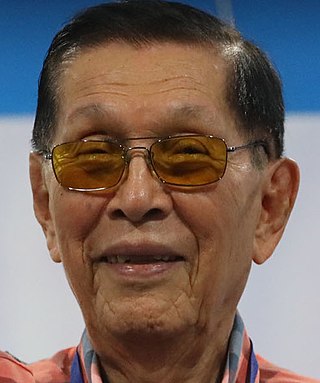
Juan Valentin Furagganan Ponce Enrile Sr.,, also referred to by his initials JPE, is a Filipino politician and lawyer known for his role in the administration of Philippine president Ferdinand Marcos; his role in the failed coup that helped hasten the 1986 People Power Revolution and the ouster of Marcos; and his tenure in the Philippine legislature in the years after the revolution. Enrile has served four terms in the Senate, in a total of twenty-two years, he holds the third longest-tenure in the history of the upper chamber. In 2022, at the age of 98, he returned to government office as the Chief Presidential Legal Counsel in the administration of President Bongbong Marcos.
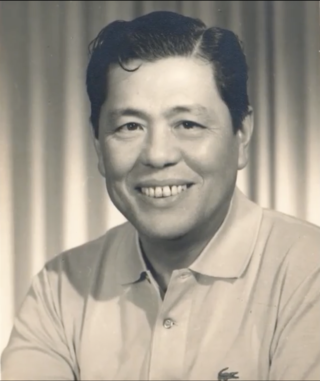
Jose Wright Diokno, also known as "Ka Pepe", was a Filipino nationalist, lawyer, and statesman. Regarded as the "Father of Human Rights," he served as Senator of the Philippines, Secretary of Justice, founding chair of the Commission on Human Rights, and founder of the Free Legal Assistance Group (FLAG), the premier group of Filipino human rights lawyers. Diokno is the only person to top both the Philippine Bar Examination and the board exam for Certified Public Accountants (CPA). His career was dedicated to the promotion of human rights, the defense of Philippine sovereignty, and the enactment of pro-Filipino economic legislation.

The United Nationalist Democratic Organization (UNIDO) was the main political multi-party electoral alliance of the traditional political opposition during the turbulent last years of Philippine President Ferdinand Marcos in the mid-1980s. It was formed in January 1980, and was originally known as the United Democratic Opposition from 1980 to 1982. It was initially a union of eight major and minor political parties and organizations with the main aim to oust President Marcos through a legal political process. In April 1982, the coalition received its present name, and increased its members to twelve parties. Shortly after the assassination of popular opposition senator Benigno Aquino Jr., the party was led by Senator Salvador Laurel of Batangas.

A parliamentary election was held on May 14, 1984, in the Philippines. Like past elections, charges of bribery, protests and complaints on irregularities marred the elections. Former Manila Times publisher Chino Roces and former senator and opposition leader Jose W. Diokno supported the campaign boycotting the election. The National Movement for Free Elections (NAMFREL) helped mitigate electoral fraud during the election.

The history of the Philippines, from 1965 to 1986, covers the presidency of Ferdinand Marcos. The Marcos era includes the final years of the Third Republic (1965–1972), the Philippines under martial law (1972–1981), and the majority of the Fourth Republic (1981–1986). By the end of the Marcos dictatorial era, the country was experiencing a debt crisis, extreme poverty, and severe underemployment.
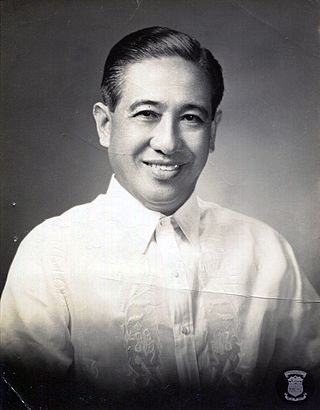
Lorenzo Martinez "Ka Tanny" Tañada Sr. was a Filipino statesman, lawyer, human and civil rights defender, and national athlete. He is often referred to as the "Grand Old Man of Philippine Politics."

Joaquin "Chino" Pardo Roces was a Filipino businessman and newspaper publisher. He was best known for being the founder of the Associated Broadcasting Corporation and a former owner of The Manila Times, as well as his staunch opposition of the administration of Ferdinand Marcos.

Lorenzo "Erin" Reyes Tañada III is a Filipino lawyer, broadcaster, and human rights and labor rights advocate who has served as a Deputy Speaker of the Philippine House of Representatives. A member of the Liberal Party, he was first elected to the House of Representatives in 2004, as the representative of the 4th District of Quezon Province.

The Welcome Rotonda, officially Mabuhay Rotonda, is a roundabout in Quezon City in the Philippines. It is located a few meters from Quezon City's border with Manila, at the intersection of E. Rodriguez, Sr. Boulevard, Mayon Street, Quezon Avenue, Nicanor Ramirez Street, and España Boulevard. It may also refer to the monument situated on its central island.

The Free Legal Assistance Group (FLAG) is a nationwide organization of human rights lawyers in the Philippines. It was founded in 1974 by Sen. Jose W. Diokno, Lorenzo Tañada, J.B.L. Reyes, and Joker Arroyo during the martial law era under former President Ferdinand Marcos. It is the first and largest group of human rights lawyers established in the nation. They work on countering varied abuses against human rights and civil liberties. Its current chairman since 2003 is human rights attorney Chel Diokno, the founding dean of the De La Salle University Tañada-Diokno School of Law.

The Bantayog ng mga Bayani, sometimes simply referred to as the Bantayog, is a monument, museum, and historical research center in Quezon City, Philippines, which honors the martyrs and heroes of the struggle against the dictatorship of 10th President Ferdinand Marcos.

The burial of Ferdinand Marcos, a former Philippine President who ruled as a dictator for 21 years, took place on November 18, 2016, at the Libingan ng mga Bayani in Fort Andres Bonifacio, Taguig, Metro Manila, Philippines. Marcos had been elected the 10th President of the Philippines in 1965, but declared Martial Law in 1972 before his final constitutionally allowed term was over, holding on to power until his overthrow by the People Power Revolution in 1986.
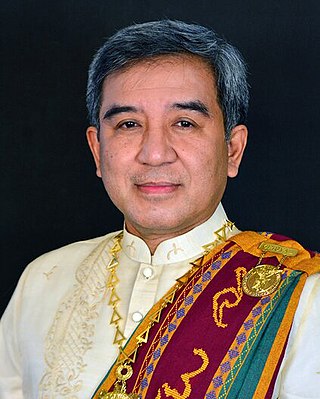
Fidel Ronquillo Nemenzo is a Filipino mathematician and professor who served as chancellor of the University of the Philippines Diliman from 2020 to 2023.

Katips, also known as Katips: The Movie, is a 2021 Filipino period musical drama film written and directed by Vincent M. Tañada. Based on Tañada's 2016 stage musical of the same name, it is about a group of student activists from the Katipunan area of Quezon City who struggle to protest the imposition of nationwide martial law in the 1970s. The film stars Jerome Ponce, Vince Tañada, Mon Confiado, Sachzna Laparan and Nicole Laurel Asensio, alongside an ensemble cast that includes Dexter Doria, Lou Veloso, Johnrey Rivas, Adelle Ibarrientos and Joshua Bulot.

In the Philippines during the dictatorship of Ferdinand Marcos, groups and individuals which opposed the regime without subscribing to leftist ideology were usually labeled with the terms "middle force," "third force," the "mainstream opposition," or more rarely, as the "conservative opposition." Mostly consisting of middle class and upper class groups which had been apolitical when Marcos first declared martial law, the most prominent examples of oppositionists in this category include religious groups, business sector groups, professional groups, social democrats, academics, journalists, and artists. Politicians from the traditional opposition are also sometimes counted in this category, although the terms are traditionally associated with ground level opposition, rather than political opposition per se.
References
- ↑ Quimpo, Susan F. (2012). Subversive lives : a family memoir of the Marcos years (First Ohio University Press ed.). Athens: Ohio University Press. ISBN 978-0-89680-495-1. OCLC 954735081.
- ↑ "'They are scared,' Martial law victim says of surprise Marcos burial". Manila Bulletin.
- ↑ "Lorenzo Tañada undaunted in line of fire". October 8, 2017.
- ↑ Oreña-Drilon, Ces (February 29, 2020). "The M-16 bullet that changed Fidel Nemenzo's life". ABS-CBN News and Public Affairs. Archived from the original on February 29, 2020. Retrieved March 2, 2020.
- ↑ Chua, Michael Charleston B. (2012) Haring Bayan: Democracy and People Power in the Philippines, in “For Democracy and Human Rights: Rekindling the Lessons of Martial Law and the People Power Revolution” (Discussion Papers for the 40th Anniversary of the Proclamation of Martial Law (Never Again, Remembering Martial Law @ 40).” Quezon City: Center for Youth Networking and Advocacy and Friedrich Ebert Stiftung.
- ↑ Sabillo, Kristine Angeli. "LOOK: Photographer shares dramatic images from anti-Marcos protests". Philippine Daily Inquirer.
- ↑ Cojuangco, Tingting. "For the love of freedom". The Philippine Star.